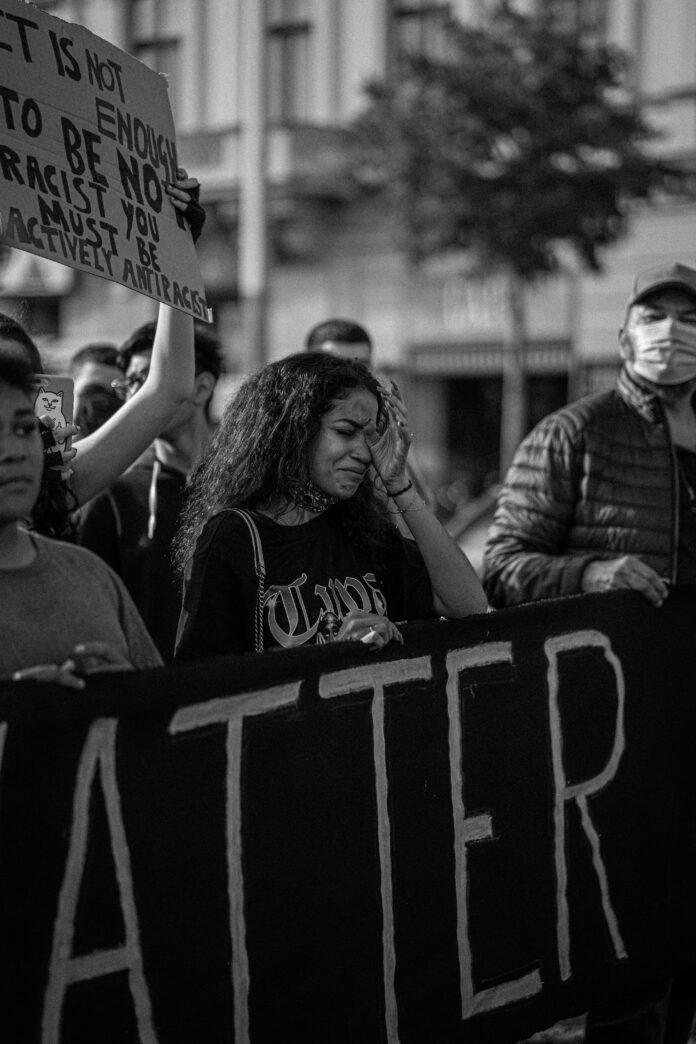( ENSPIRE Health & Wellness ) Tips On How To Handle Racial Trauma From Repeated Racially-Motivated Acts
ENSPIRE Contributor: Naomi Stamps
Racial trauma is something many people of color have endured for years (especially during the events that transpired in 2020). When a new story emerges of another person of color senselessly murdered, our nation is called to protest, sign petitions, and regularly call state politicians. While it’s important to ensure we hold people accountable for their actions, we often forget the importance of treating any racial trauma we face.
Because we’re often pressured to act immediately, we feel guilty if we don’t take part, which results in us pushing our feelings to the side. Our hearts are in the right place, but it’s essential for us to practice self-care before helping others. Refusing to do so affects both our productivity and mental health. Here are ten tips on how to handle racial trauma to maintain your health and well-being.

- Acknowledge your emotions.
Sometimes we bottle up our emotions because we’re either afraid to face them or feel it’ll distract us from daily tasks. But the true reality is that holding emotions in can worsen your racial trauma. It’s okay to be sad, angry, and frustrated. Releasing these emotions can help you to heal and better focus on tasks ahead.
- Take a break from social media and the news.
Staying in the know is important, but so is the amount we absorb. When news stories hit back to back in 2020, many were deeply depressed and struggled with remaining productive. News stories can become toxic if we allow them to be. Turn off all notifications for however long you need to clear your head.

- Get enough rest.
This tip may seem cliche, but restlessness is a common side effect of racial trauma. If you’re having issues sleeping, try exercising, take a bath/shower, or listen to some soothing music. These may help you relax and ease any tension you have.
- Take up a new hobby.
Learning a new skill can help distract you from news overload and maintain mental health. Think about what you’re interested in or seek recommendations from others. This will help to ensure you’re channeling your energy towards something positive instead of racial trauma. You can also immerse yourself in a favorite hobby if you have one.

- Talk to someone you trust.
Getting things off your chest can bring an abundance of relief to your mind and body. Talk to a friend, family member, or another person you’re close to. They can offer you the support and advice you need to push forward.
- Remember, it’s okay to be silent.
Racial trauma affects everyone differently, and some of us need time to process our emotions. If you’re not ready to talk, don’t let anyone pressure you into a conversation or to immediately take social action. If they genuinely care, they’ll respectfully give you space. When I faced relatives who wanted to talk about the 2020 events, it was hard to get them to understand that I needed a break from the conversations.
What I found to be the most helpful is to remain silent, listen attentively, and nod to acknowledge I was paying attention. When they finished, I excused myself and continued to complete my tasks. Being silent doesn’t make us rude or mean that we don’t care. We are simply looking out for our health so we can better serve others.

- Consider journaling.
If you’re still struggling with your emotions, journaling can help you to explore better. Write for a few minutes each day to either vent or reflect. If you don’t like writing by hand, you can always find an online journal.
- Identify your triggers and address them.
What sources are causing you to feel distraught? Who’s saying things to make you upset? Constantly watching video clips of someone being attacked/killed or hearing someone talk about it can worsen racial trauma. It’s important to learn what triggers you so you can limit your exposure or stay away from it altogether.

- Volunteer.
Find a cause that you’re passionate about and offer your time. Many people say it’s a great feeling to give back to the community and connect with others. You can also be a virtual volunteer.
- Remember your worth.
It’s difficult to stay hopeful when we witness racial injustice. But we can’t allow the news to dictate what we can accomplish. We are an important voice in a sea of chaos and cannot allow racial trauma to stop our progress. Believe it or not, someone depends on us.

I hope you find these tips to be useful. If you know someone who needs some help, share this article with them. Mental health is a serious issue that shouldn’t be pushed aside. The only way that racial trauma will ever win is if we give in to the negativity. We cannot erase racism, but we can always change how we respond to it. Remember to take breaks when necessary. Also, just because others ignore your feelings doesn’t mean they don’t matter.
Related Article: SACRED Birth Study To Combat Obstetric Racism







